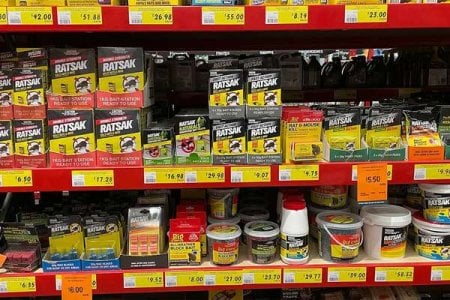‘They're going to kill everything’: Urgent warning over household product endangering Aussie wildlife
By
Maan
- Replies 10
Rodent control is a common household necessity, but what if the very products designed to manage pests were also endangering some of Australia's most vulnerable wildlife?
New research had uncovered alarming evidence that widely available rat baits were impacting native carnivorous mammals.
These products, intended for pest control, appeared to have unintended—and potentially devastating—consequences for wildlife.
Commonly sold rat poisons posed a severe threat to Australia’s carnivorous marsupials, with new research revealing their impact was more widespread than previously understood.
A study by Edith Cowan University found that five species—including Tasmanian devils and quolls—were at risk due to exposure to second-generation rodenticides.
Dr Michael Lohr, a researcher and adjunct lecture shared: ‘This is the first documentation of pretty substantial rodenticide exposure in our entire suite of top marsupial carnivores in Australia.’
He warned that exposure levels in Tasmanian devils and quolls could significantly affect their already vulnerable populations.
‘Action is needed on this and the world has already agreed on that,’ he said.’
Second-generation rodenticides were banned or restricted in regions like the US, EU, and UK.
Despite this, they remained readily available in Australia, stocked by major retailers alongside less harmful alternatives.
Despite a review by the Australian Pesticides and Veterinary Medicines Authority (APVMA), conservationists argued that action needed to be taken immediately.
Bunnings defended its sale of the controversial products, stating it offered a variety of pest control solutions to allow consumers ‘choice’.
The retailer introduced QR codes in the pest control aisle to help customers learn more about the products.
Critics argued that clear warnings about wildlife risks should be more prominent.
A petition calling on Coles and Woolworths to remove second-generation rat poisons had gained over 7,000 signatures.
Wildlife advocate Cat Coake said: ‘Otherwise they're going to kill everything.’
Coles and Mitre 10’s parent company, Metcash, did not respond to media inquiries.
Woolworths stated its range of second-generation anticoagulants was limited.
The company said these products were primarily intended for rural households and workplaces.
The Edith Cowan University study found that 5 per cent of juvenile Tasmanian devils had been exposed to lethal doses of rodenticides.
Another 10 per cent had potentially fatal levels.
A further 30 per cent had sub-lethal doses that could weaken their immune systems.
Exposure to these toxins was also detected in northern, spotted-tailed, eastern, and western quolls, all of which were already at risk of extinction.
Similar concerns had been raised overseas, with second-generation anticoagulants being linked to owl deaths in Canada, leading to their removal from consumer sale.
Associate Professor Dr Rob Davis from Edith Cowan University urged tighter regulations.
He stated: ‘Our hope is that the Australian Government restricts the widespread sale of pesticides or [second-generation anticoagulant rodenticides] in line with other countries, including Europe and North America.’
He encouraged consumers to educate themselves on safer rodent control alternatives that did not contain anticoagulants.
Curious about more wildlife stories? Check out these surprising encounters and urgent conservation concerns.

With the future of Australia’s native carnivores hanging in the balance, should stronger regulations be put in place to restrict these harmful poisons?
Let us know your thoughts in the comments.
New research had uncovered alarming evidence that widely available rat baits were impacting native carnivorous mammals.
These products, intended for pest control, appeared to have unintended—and potentially devastating—consequences for wildlife.
Commonly sold rat poisons posed a severe threat to Australia’s carnivorous marsupials, with new research revealing their impact was more widespread than previously understood.
A study by Edith Cowan University found that five species—including Tasmanian devils and quolls—were at risk due to exposure to second-generation rodenticides.
Dr Michael Lohr, a researcher and adjunct lecture shared: ‘This is the first documentation of pretty substantial rodenticide exposure in our entire suite of top marsupial carnivores in Australia.’
He warned that exposure levels in Tasmanian devils and quolls could significantly affect their already vulnerable populations.
‘Action is needed on this and the world has already agreed on that,’ he said.’
Second-generation rodenticides were banned or restricted in regions like the US, EU, and UK.
Despite this, they remained readily available in Australia, stocked by major retailers alongside less harmful alternatives.
Despite a review by the Australian Pesticides and Veterinary Medicines Authority (APVMA), conservationists argued that action needed to be taken immediately.
Bunnings defended its sale of the controversial products, stating it offered a variety of pest control solutions to allow consumers ‘choice’.
The retailer introduced QR codes in the pest control aisle to help customers learn more about the products.
Critics argued that clear warnings about wildlife risks should be more prominent.
A petition calling on Coles and Woolworths to remove second-generation rat poisons had gained over 7,000 signatures.
Wildlife advocate Cat Coake said: ‘Otherwise they're going to kill everything.’
Coles and Mitre 10’s parent company, Metcash, did not respond to media inquiries.
Woolworths stated its range of second-generation anticoagulants was limited.
The company said these products were primarily intended for rural households and workplaces.
The Edith Cowan University study found that 5 per cent of juvenile Tasmanian devils had been exposed to lethal doses of rodenticides.
Another 10 per cent had potentially fatal levels.
A further 30 per cent had sub-lethal doses that could weaken their immune systems.
Exposure to these toxins was also detected in northern, spotted-tailed, eastern, and western quolls, all of which were already at risk of extinction.
Similar concerns had been raised overseas, with second-generation anticoagulants being linked to owl deaths in Canada, leading to their removal from consumer sale.
Associate Professor Dr Rob Davis from Edith Cowan University urged tighter regulations.
He stated: ‘Our hope is that the Australian Government restricts the widespread sale of pesticides or [second-generation anticoagulant rodenticides] in line with other countries, including Europe and North America.’
He encouraged consumers to educate themselves on safer rodent control alternatives that did not contain anticoagulants.
Curious about more wildlife stories? Check out these surprising encounters and urgent conservation concerns.
- Government funding disparities raise concerns over wildlife protection
- ‘It looked like it had just eaten a pretty big meal.’: Wildlife found in a cafe leaves expert stunned
- Wildlife alert: Expert warns against touching these finds in Australian gardens
- ‘I thought I was dead’: Shocking wildlife encounter caught on camera
Key Takeaways
- Research found that second-generation rodenticides posed a severe threat to Tasmanian devils and quolls, with exposure levels potentially devastating their already vulnerable populations.
- Despite being banned or restricted in the US, EU, and UK, these poisons remained readily available in Australia, stocked by major retailers alongside safer alternatives.
- Bunnings defended its sale of the products as consumer ‘choice’, while Woolworths stated its range was limited; Coles and Mitre 10’s parent company, Metcash, did not respond to inquiries.
- Experts urged the Australian Government to tighten regulations, while conservationists encouraged consumers to switch to non-anticoagulant alternatives to protect wildlife.
With the future of Australia’s native carnivores hanging in the balance, should stronger regulations be put in place to restrict these harmful poisons?
Let us know your thoughts in the comments.








